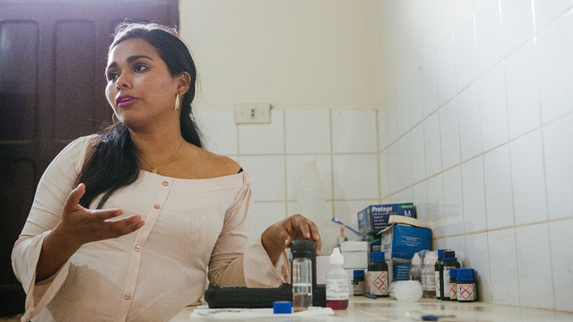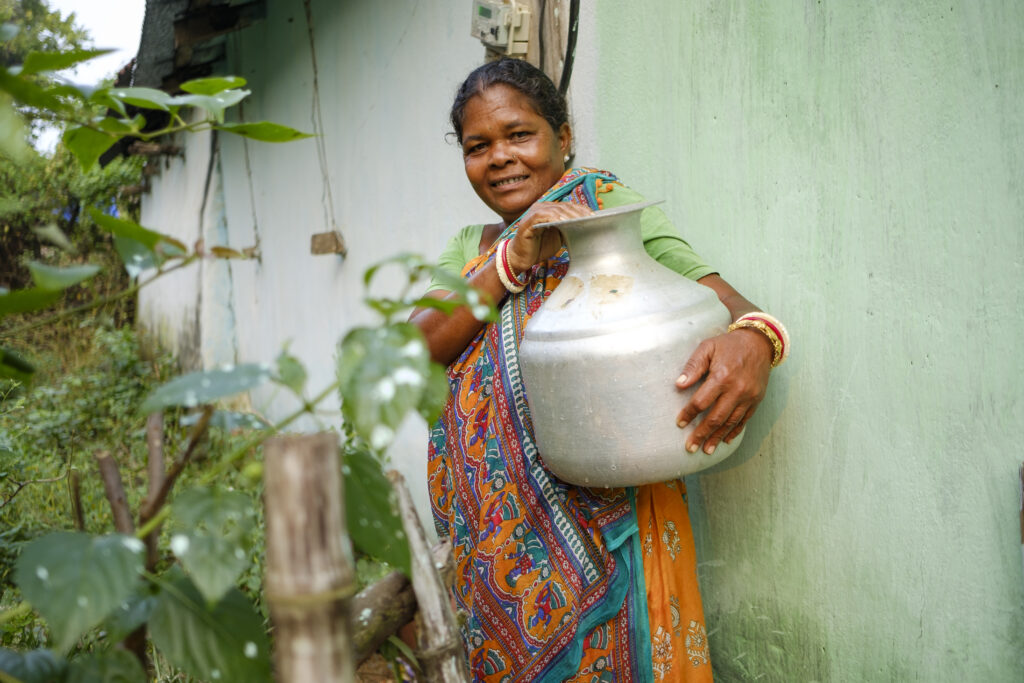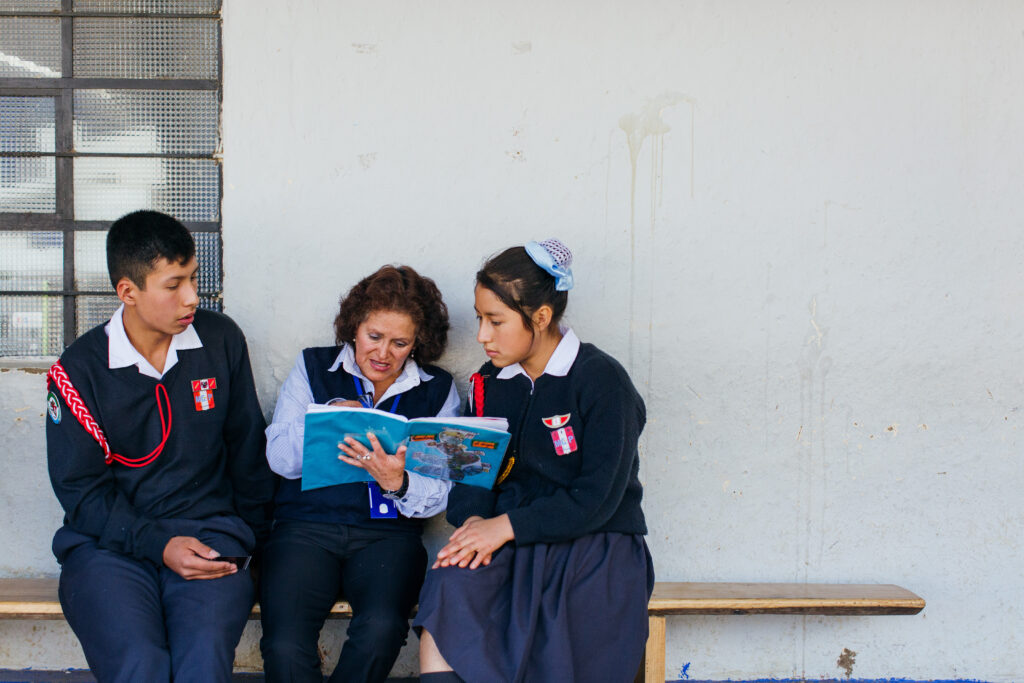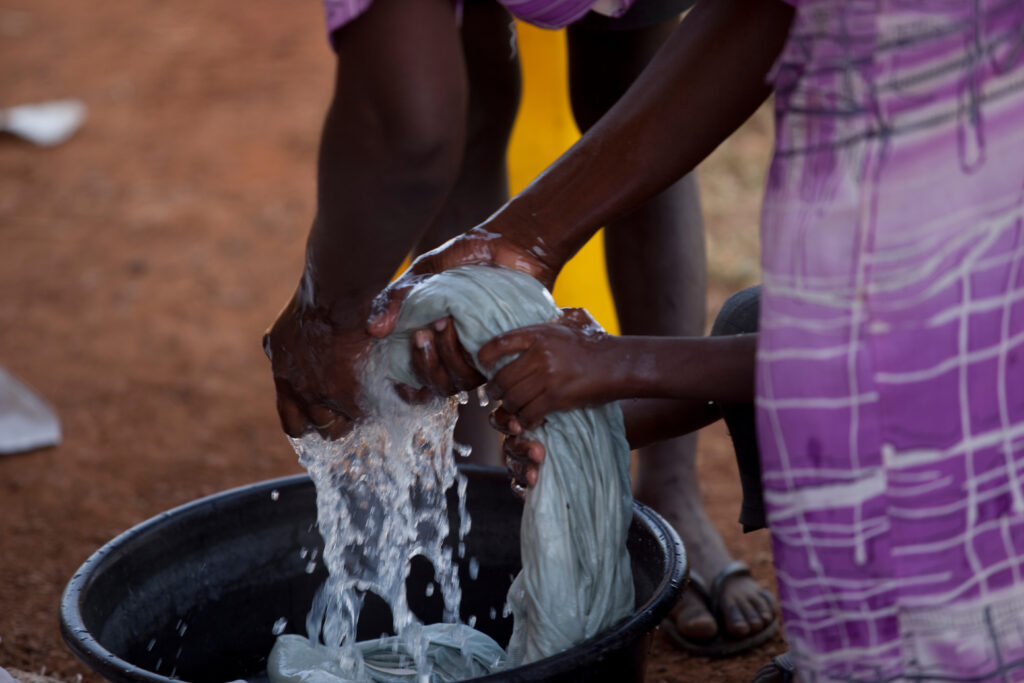This is a transcript of Eleanor Allen’s keynote speech from Latinosan, April 2019.
Versión en español aquí.
We are all here this week to learn, share, and hopefully change the way water and sanitation services are delivered in order to accelerate our progress. To achieve these objectives, I am going to share how agents of change are putting sustainable services with our reach. Water For People has experience over the last eight years changing the way that water and sanitation are delivered, focusing on strengthening authorities and service providers. Today, I will share with you three stories that highlight how we have achieved this through agents of change. What is needed to achieve sustainable services and change this system of service provision?
- Vision that shifts the status quo
- Political will to change
- Leadership with belief and ability to make change
This requires community, district, and national level collaboration.

COMMUNITY
Lilian was tired of walking over an hour and a half every day to fetch water from her town’s single water source in the district of San Pedro, Bolivia. Her kids were often dirty. The water they collected from the water hole in their town made them sick, causing them to miss school. This dirty water also caused malnutrition in her children since they couldn’t absorb all the nutrients from their food.

Lilian is a typical story of a woman we might meet in a district like San Pedro, or any of the countries where Water For People works in Latin America. She really wanted to spend more time working on her farm, earning money for her family. She couldn’t do this if she was spending time walking for water so her family could cook and bathe. She dreamed of the day when she had water at her house, a shower, and a toilet. She went to the mayor to ask for water. The mayor said she could help, but that the community would need to organize itself to help pay for the infrastructure needed. Nothing was free.
Lilian helped organize the community. They needed to set up a water committee and prepare the legal documents. Lilian became the first president of the committee. The people trusted her and did what she asked. The mayor, through the local water and sanitation office (called a DMSB in Bolivia) supported her and provided political will to facilitate the community changes.
As President of the committee, Lilian explained why each family needed a micrometer. This was to be fair, so each family would only pay for what they used.
The water rate is set using a model that calculates the actual cost of service of her community’s system, she explained to her neighbors. This includes paying an operator to keep the system running and having spare parts available for repairs. The days of the "extraordinary" tariff — collecting money from everyone in the community when the system breaks — were over. Thankfully. That was always frustrating since it came at unexpected times when it seemed Lilian most needed her money. Lilian and her neighbors were motivated to support construction of this new water system.
Lilian is a community leader and a changemaker. She has a vision, believes in the work that she does, and is leading social change in her community. Her children are proud of her, and her community is grateful for her leadership. Through the mayor she was able to find the support and political will the community needed to get sustainable services). Water for Everyone Forever. It used to be a dream, but now it is a reality.
DISTRICT
Enter Yanine. 27-year-old Yanine was hired as the first female district water and sanitation officer in San Pedro. This was the turning point toward achieving sustainable services in the district. The mayor supported her and provided the political will to facilitate the changes needed. She knew the status of each community water system — the infrastructure, the strength of the water committee, the water quality — if it was potable, if the right monthly rate was being charged and collected, if someone was trained and doing basic operations and maintenance, and if there was a water resources plan in place to ensure long-term water supply.

Part of the role of the water and sanitation office is to have an asset management plan. With this, Yanine knew where all the critical assets were, and what needed to be replaced and when. Yanine developed a workplan and schedule to get all the water committees and community systems to a level where they are providing a good service to the residents. It was all a part of the master plan to reach Everyone Forever in San Pedro. Her hard work paid off. In 2018, San Pedro became the first district in Bolivia to have sustainable services.
Water For People, led by Alberto Yutronic in Bolivia (he is here this week!), is following our process of establishing sustainable services. Water For People has now transitioned to an oversight-only role, and we anticipate exiting in the next few years, after observing the district sustain services independently.
Yanine is a district leader and a changemaker. She has a vision, believes in the work that she does, and is leading social change in her district. And she knows that being a woman leader makes her a role model for girls in the community — so they want to stay in school and aspire to have jobs that provide a better future for their communities, just like she has.
NATIONAL

Betty has worked her entire career to improve the quality of life through water for the people of Bolivia. She was Water For People Country Director from 2009 to 2014, and her entire career has been laser-focused on water. It has been difficult yet rewarding. Today she is working on the national program for rural water and sanitation (Mas Agua para Todos) with the vice-ministry of water and the environment. The goal is to reach SDG 6.1 — sustainable water management for all Bolivians — by 2030. What has been satisfying about Betty’s work is that she is able to connect the dots from her experience with Water For People to create a vision for the future and a road map to scale water services for her entire country.

Betty supports the Viceminister of Water, Julia Collado, who provides the political will to facilitate the changes needed. The Everyone Forever model of sustainable services that Lilian and Yanine were part of in San Pedro, and that Viceminister Collado is now replicating, was begun by Betty and her Water For People team in the late 2000s in Cochabamba. In fact, in 2012 Cuchumuela was celebrated as the first district in all Bolivia to have established drinking water services in all communities. This was one of the first districts where Water For People implemented the Everyone Forever model.
Since then, the influence of the model has grown. In 2017, replication of the model was adopted by two states — Oruro and Tarija. They are working on reaching Everyone Forever with technical assistance from Betty’s team. And Betty is now working on a national policy to create much-needed district WASH offices in all 338 districts of Bolivia. Betty is a national leader and a changemaker. She has a vision, believes in the work that she does, and is leading social change in her country.
These three stories of Lilian, Yanine, and Betty have similar elements of change that enable sustainable services to thrive:
- Vision that shifts the status quo
- Political will to change
- Leadership with belief and ability to make change
Of all the countries where Water For People works, Bolivia is the first where we will successfully exit a district, having reached Everyone there with services we are confident will last Forever. This is a paradigm shift we want to see happen around the world — districts, and eventually entire countries — where every single person has water that can be sustained without ongoing aid. When our sector can scale this type of model, we can end the global water crisis for the 2.1 billion people globally — nearly one in three — without safe water.
According to the Joint Monitoring Programme, 71% of families globally have safely managed water. In Latin America, only 65% have safe water. We have much work to do to get services at a level that all citizens of Latin America deserve. But no one can do this alone. The close collaboration between those of us working in water and sanitation is fundamental to change the system of delivering these services.
The three stories I’ve told — of Lilian, Yanine, and Betty — show that some of the key ingredients to making this happen are vision, political will, and leadership. I challenge all of you to be actors in making this happen. With the right people in place, we can make change happen — for Everyone Forever.
To achieve SDG 6, we should adopt a systems-change focus that provides services that will be sustainable. It should not just be about building and rehabilitating infrastructure. Rather, it should look at the entire enabling environment, complete with financing, operations and maintenance, and the agents of change within that environment to fundamentally transform how we progress toward SDG 6.



